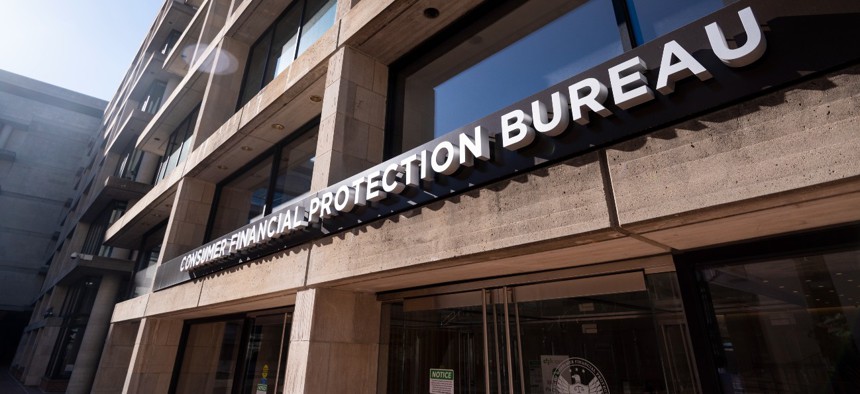
A CFPB spokesperson said the agency is committed to pay equity but can't discuss ongoing negotiations. Bill Clark/CQ-Roll Call, Inc via Getty Images
The Consumer Protection Bureau's Union Is Pushing for Better Pay, Fewer Pay Gaps
CFPB employee representatives said the agency is dragging its feet on plans to reduce gender and racial pay gaps, as well as to comply with federal law requiring compensation comparable with other financial regulators.
Leaders of a union representing Consumer Financial Protection Bureau employees are urging management to stop dragging its feet on efforts to eliminate a series of pay disparities at the agency, including between CFPB workers and their counterparts at other financial regulators.
Unlike most federal agencies, the compensation of employees at the CFPB is not tied to the General Schedule, in order to better equip the agency to compete for talent with financial institutions and other regulatory agencies. Unions at the CFPB therefore can bargain with management over pay, unlike many of their counterparts elsewhere in government.
But National Treasury Employees Union Chapter 335, which represents CFPB workers, said the agency’s policies have contributed to significant gender and racial pay gaps, and the agency has failed to meet its legal obligation to keep pace with other regulators like the Federal Reserve Board on pay. The Dodd-Frank Act, which established CFPB, requires that the agency's compensation be “comparable” to that of employees at the Federal Reserve.
The union conducted an internal study of CFPB compensation in 2020, and found that Black employees were paid a median $20,000 per year in base pay less than their white counterparts. And racial pay gaps were exacerbated when accounting for gender as well—Hispanic women made around $18,600 less per year than White men, compared to an overall Hispanic base pay disparity of $16,000.
Catherine Farman, president of NTEU Chapter 335, said that in January 2021, the union reached an agreement with management for the agency to conduct an agency-wide salary review process to ensure that employees with similar experience and job duties are paid the same amount.
“The main [2021] agreement was around getting a bureau-wide salary review and reset, which set out the goal and terms for looking at everybody’s salary, evaluating every current employee’s work experience and resume, and using that to set salaries under the same pay-setting policy,” Farman said. “It takes out the subjective factors that used to be in various versions of the policy, like ‘skills,’ ‘knowledge,’ and the haggling that goes on that is completely based on subjective decisions by those folks.”
But in the nearly two years since the agreement was reached, the salary review and reset has yet to actually take place. Farman said that there have been numerous delays stemming from issues with the data collection required at the start of the process, chalking much of it up to the fact that initially, CFPB assigned the entire project to one employee.
“The main reason is that there was mismanagement in the Office of Human Capital of our work experience data,” she said. “[They] basically had one person working on it, and they never dedicated the resources necessary to actually do this reset and analysis, and there’s been a lack of accountability and oversight under multiple directors [of the office] to take responsibility. It was just an impossible task for one person.”
Last summer, CFPB finally answered the union’s complaints about the process, brought in additional contractors and the salary analysis process resumed in August. Those delays have hampered ongoing negotiations between the union and management on a new set of pay bands governing the agency, which remains ongoing with the help of an independent mediator.
“Our goals are still equal pay and comparable pay [with other regulators], tackling the pay disparities and racial disparities,” Farman said. “Aside from the racial pay gaps, the other fundamental lack in the current compensation system is comparable pay, which is a specific term laid out in Dodd-Frank and another statute. The statutes on this require us to be paid comparably to the Federal Reserve Board and other federal regulators, but we’re not paid as much as these workers at other agencies, so we regularly have folks leaving for those agencies or otherwise getting poached due to that, and it’s something the bureau’s never addressed.”
According to data compiled by the union, salary bands at the Federal Reserve Board have increased 30.6% between 2012 and 2022, while CFPB pay bands have only increased by 1%. Although the CFPB agreed to the salary review, Farman said that in negotiations, the agency still has declined to concede that pay gaps exist within the workforce, and has resisted calls to update salary bands to better reflect how much other federal regulators make.
“The bureau’s only concern since we went to the bargaining table over pay is budgets,” she said. “They’re concerned about the cost of paying out to employees what we’re owed, and they’re concerned about how much it’ll cost for us to fix the racial pay gaps. They won’t acknowledge that they’re real . . . It’s very much nickel and diming the employees out of what we’re frankly owed.”
In a statement, a CFPB spokesperson said the agency is committed to ensuring its workforce is paid equitably but it couldn’t comment on subjects discussed during mediation.
“The CFPB is working with NTEU on compensation reform and is committed to ensuring that staff are paid equitably,” the spokesperson said. “CFPB and NTEU entered mediation in October and we remain hopeful that we can reach an agreement soon. The mediation process is confidential, so we cannot comment publicly on those discussions.”







